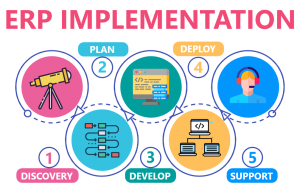Telecom Sector ERP – Telecom behemoths fight to deliver the best service at the lowest possible cost. Customers have always sought the most outstanding service since it became a part of our everyday lives. The question is how industry titans are dealing with shifting client expectations, and the answer is by incorporating Enterprise Resource Planning (ERP) software into the firm.

Telecom Sector ERP software integrates with the industry’s main businesses by delivering a portfolio of applications and built-in capabilities for a fair and dependable corporate environment. As a result, an ERP can:
• Gives you real-time visibility into operational and financial processes.
• Monitor and manage regulatory and compliance concerns.
• Increase product and service revenue.
• Keep track of and monitor existing assets, as well as plan for new investment portfolios.
The complexity of this domain necessitates the use of a system that can be updated on the go and stay scalable throughout the process. This essay will explain how an ERP system may help the telecom business expand.
Advantages of an Telecom Sector ERP
Any company organization’s operational efficiency improves with the deployment of an ERP system. However, the problem is how an ERP system can assist a telecommunications company. The following are distinct advantages.

1. Need to Reduce Diverse Systems
A cloud-based ERP system removes the need to go via several point solutions because executives will access reliable data that connects across divisions and platforms. Telecom businesses can concentrate on their consumers rather than managing their business processes with a unified system.
2. Unmatched Data Security
Cloud-based ERP systems have attracted worldwide recognition. They offer more excellent data protection than a traditional on-premise solution. Growing attackers are targeting vulnerable legacy systems to compromise data. Most telecom businesses around the world place a high value on data security.
3. Overcoming Operational Gaps
ERP systems are well known for optimizing process parameters. They identify operational gaps and assist in successfully removing barriers. ERPs can generate optimum schedules to improve production efficiency and timely delivery.
How Can Telecom Sector ERP Aid the Telecom Industry Overcome Major Challenges?
The telecommunications business is constantly confronted with new difficulties. It is critical to keep a tool on hand to deal with any new issues that arise. The following section explains how an ERP system can deal with it.

1. Vague Back-Office Operations
Back-office processes can be automated and integrated into a common platform with an effective cloud ERP system. Managers may get a 360-degree perspective of the entire business 24 hours a day, seven days a week. In today’s fiercely competitive telecom sector, automating these many operations is a must.
2. Managing Operational Costs
An integrated ERP may redirect your focus away from software upgrades and upkeep and toward essential customer needs. Running disparate systems (spreadsheets, accounting software, etc.) is expensive due to the ongoing lack of changes. A unified platform capable of controlling all aspects of the business simply minimizes the burden.
3. Growth Factor
Since a calendar year is equivalent to three internet years, the telecom business is rushing. Holding on to older systems can be a significant impediment to progress. Because all users are always up to date, cloud-based ERP solutions may expand with your organization and reduce unnecessary licensing and maintenance fees.
4. Service Upgrades
Existing financial instruments are having difficulty accommodating new business ideas and services. ERPs have built-in tools and modifications that are continually updated. These technologies make it simple to incorporate any new project plans into the existing system. They are well-known for accommodating a wide range of currencies, languages, and regulatory standards.
5. Acquiring Business Insights
Recognizing places where growth is halted is critical in a customer-centric firm. With the use of dashboards and reports and business analytics, ERPs can offer you vital insights. Companies should be able to acquire insights regarding profitability by client or service to do so.
6. Managing Manpower
Human resource management is a time-consuming and challenging procedure. An ERP system can track personnel and address all of their needs on time. ERPs, on the other hand, reduce duplicate data and human errors.
NetSuite Telecom Sector ERP for Telecom Industry
NetSuite is the world’s most excellent cloud-based ERP software, capable of automating both front-end and back-end activities. The cloud ERP adds many benefits to the package, such as flexibility, scalability, the lower total cost of ownership (TCO), automatic upgrades, etc. Everyone in the organization who has NetSuite access gets a personalized view of the essential KPIs linked to their area of expertise.

A reliable ERP system is required if your growing organization struggles to manage business operations and access real-time business data. NetSuite implementation can assist you in managing this effectively. Contact the specialists at Connected IT Consulting for quick assistance.
Business Process Mapping
ERP Project Management
ERP consulting
Small Business ERP



